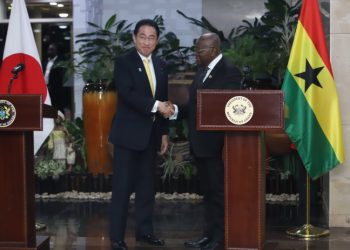
The resurgence of global energy prices in the third quarter of 2023 is a timely reminder that central banks’ spirited war against inflation is yet to be won.
Although global inflation has decelerated from the record highs of 2022, inflation in the US, the UK and the EU is still higher than the 2% target that central banks in these economies consider to be the ideal rate of inflation. This increases the possibility of central banks in Africa and around the world – especially the closely watched US Federal Reserve – maintaining the prevailing high-interest rates for the foreseeable future.
“Inflation continues to be too high and I suspect it will be appropriate for the Fed to raise rates further and hold them at a restrictive level for some time,” said Michelle Bowman, member of the Federal Reserve Board of Governors, in October remarks on the economy and bank regulation. The Fed’s monetary policy decisions tend to be highly consequential for the global financial system.
The managing director of the International Monetary Fund (IMF), Kristalina Georgieva, expects inflation in several countries to remain above target until 2025. Speaking in October in Abidjan, Côte d’Ivoire, she urged central banks to avoid prematurely easing monetary policy in light of sticky inflation.
Higher borrowing costs for Africa
The likelihood of interest rates staying high in 2024 and beyond presents unique challenges for many African economies, including regional powerhouses such as South Africa, Nigeria, Kenya and Egypt. These countries’ public debt levels have risen significantly in recent years as their respective governments have had to rapidly increase public spending to mitigate the effects of multiple global shocks such as Covid-19 and inflation.
The challenge of rising public debt amid increasingly high interest rates in Africa has been compounded by the fact that the majority of local currencies across the continent have lost ground against the US dollar in recent years. This has made imports costlier and increased debt service costs for dollar-denominated external debt.
The new era of high interest rates puts Africa in a tough spot because of how fast public debt across the continent has expanded in the past five to ten years. In South Africa, for example, net government debt figures are expected to reach R5.09 trillion ($270.2bn), or about 84.9% of GDP, in 2023-24 from R3.66 trillion, or about 74.3% of GDP, in 2020-21. The situation is more dire in Nigeria, where total public debt has increased more than fivefold in the past decade from N7.56 trillion in December 2012 to N39.56 trillion in December 2021, with recent figures showing the trend has continued in the past two years. Over the same period the value of the naira has fallen from around N158/dollar to N764/dollar.
In Kenya, East Africa’s largest economy, the national debt increased from $35.39bn in 2018 to $55.08bn in 2021, and $71.48bn in 2023, according to data compiled from official sources by Statista. The global research firm projects that Kenya’s national debt will continuously increase between 2023 and 2028 by a total of $36.7bn. Shifting to Egypt, North Africa’s biggest economy, the government’s gross debt is expected to rise to 92.7% of GDP in 2023, up from 88.5% in 2022. According to the IMF’s latest Fiscal Monitor report, Egypt’s debt-to-GDP ratio is the highest among emerging market and middle-income countries.
Countries with high levels of national debt often develop a chronic reliance on domestic and global capital markets to refinance maturing government securities and pay their bills. With central banks likely to maintain high interest rates in the coming year, major African economies with growing levels of public debt such as South Africa, Nigeria, Kenya and Egypt may find themselves having to contend with the consequences of higher borrowing costs.
Squeeze on spending
One major consequence of higher borrowing costs is that it reduces government spending on development and recurrent expenditures such as salaries since an increasing share of tax revenue is taken up by debt service costs.
High borrowing costs also have implications for businesses and households. When interest rates on government securities are high, banks prefer parking their capital in risk-free treasury bonds and bills instead of lending to businesses. This usually starves businesses of capital to grow and expand, negatively impacting job creation and economic growth.
The other risk posed by high interest rates is that, if debt repayments surpass available resources, a government could default on its debt, which would have dire consequences for the country’s economy. There are growing fears that some of the African countries currently experiencing debt distress are at risk of default.
Seven to eight African countries require debt restructuring, Abebe Selassie, director of the IMF’s African Department, told the press at the IMF and World Bank’s Annual Meetings in Marrakech, Morocco, in October. These countries are facing a funding squeeze that necessitates international relief. Ghana and Zambia have both sought IMF emergency bailouts and are in the process of restructuring their debts. Other countries under watch include Kenya, Angola, Malawi, and Mozambique, he said.
Political costs of averting crisis
To avoid a debt crisis, African governments will need to undertake extensive economic and fiscal reforms as well as partner with global and regional banks, including partners such as the IMF and World Bank.
China has also become an increasingly important player in debt negotiations, having loaned the continent over $170bn between 2000 and 2022 – almost two-thirds as much as the World Bank, according to estimates from the Boston University Global Development Policy Center.
African leaders and heads of government are coming to terms with the fact that averting a debt crisis will come with high political costs. Cutting government spending, privatising national assets or pledging them as collateral for loans, increasing taxes, and reforming public institutions are examples of some of the reform measures that creditors typically propose in debt negotiations with debt-distressed countries. These all require political manoeuvring and can come at steep costs for incumbents seeking re-election.
The IMF has been increasingly pushing for reforms as part of its conditions for extending loans and assistance to African countries. One of the main measures it has called for is increased domestic resource mobilisation, noting that this is more effective than spending cuts, which may be counterproductive given Africa’s large development needs.
“Sub-Saharan African countries tend to rely excessively on expenditure cuts to reduce their fiscal deficits. Although this may be warranted in some circumstances, revenue measures, like eliminating tax exemptions or digitalising filing and payment systems, should play a greater role,” wrote Fabio Comelli, senior economist in the IMF’s Africa Department in a September note co-authored with other IMF officials.
In light of the political difficulties that come with mobilising taxes, Comelli and his colleagues further note that “Communication campaigns that transparently and credibly outline the long-term benefits of the reform, its distributional consequences, and the costs of inaction are also critical. Public acceptance of reforms depends more generally on the ability of governments to convince the population that they will use public funds in an efficient, fair, and transparent manner.”
Reforms needed
It is the view of some leaders in Africa and beyond that the reforms needed to resolve Africa’s debt problem must extend beyond the continent and include global credit rating agencies as well. According to the UN Conference on Trade and Development (UNCTAD), African countries are paying eight times more in interest on loans than their European counterparts and four times more than the US on account of distorted assessments by global credit rating agencies.
“Let me be sincere saying that the rating agencies don’t help, they really hurt us because they produce that perception. It doesn’t make any sense that the developing countries, Africa in this case, are paying eight times the rates that European countries are paying for the same debt,” UNCTAD secretary-general Rebeca Grynspan told reporters in Nairobi, Kenya, in August. This view has been echoed by the African Union (AU) as well as prominent business leaders such as Sudanese-British billionaire Mo Ibrahim, who spoke on the subject at the IMF and World Bank October Annual Meetings in Morocco.
DISCLAIMER: The Views, Comments, Opinions, Contributions and Statements made by Readers and Contributors on this platform do not necessarily represent the views or policy of Multimedia Group Limited.
Tags:
- President Commissions 36.5 Million Dollars Hospital In The Tain District
- You Will Not Go Free For Killing An Hard Working MP – Akufo-Addo To MP’s Killer
- I Will Lead You To Victory – Ato Forson Assures NDC Supporters
Visit Our Social Media for More




